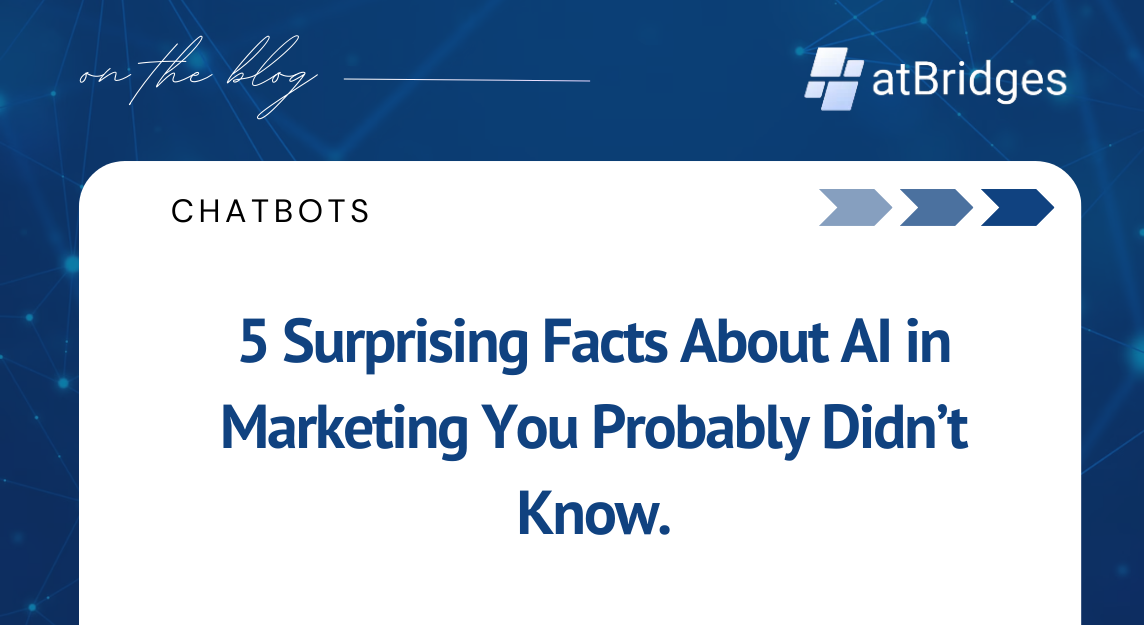5 Surprising Facts About AI in Marketing You Probably Didn’t Know.

Artificial intelligence fundamentally transforms the marketing industry, allowing for smarter and more efficient ways to reach customers. While most of us have been exposed to some use of AI, there are many fascinating and lesser-known ways AI is revolutionizing the marketing landscape. Here are five surprising facts about AI in marketing that could alter your perspective.
1. AI Anticipates Customer Needs Before They Realize Them
Predictive Capabilities:
AI marketing tools are peculiar by their very nature because they are capable of filtering extremely large datasets related to past interactions for the prediction of future behavior on the part of consumers.This kind of predictive analysis helps marketers in being able to predict future trends, making recommendations that are personalized with regards to a consumer's choices, and even tracking the needs of customers even before they are conscious of doing so themselves.
Real-World Example:
Amazon utilizes AI marketing automation to predict products that best suit buyers' surfing and purchasing history, hence bringing an increase in sales and raising the level of satisfaction from the customers.
Key Benefit:
Predictive AI marketing tools enable businesses to be ahead of consumer demands, to have timely product or content offerings to the consumers.
2. Generative AI Can Produce Entire Campaigns in Minutes
Thanks to generative AI marketing, a company can prepare ads, emails, social media posts, among many others things, in minutes. It saves time and cuts the cost of preparations so marketers can enjoy doing strategic things rather than administrative work.
Examples of Tools:
Jasper Copy.ai or atbridges are examples of such tools which can be seen to deliver good copies so fast.
Key Benefit:
Generative AI should free up some marketer time from being more innovative and engaging by enabling quicker creation of content.
3. AI Can Create, Edit, and Personalize Marketing Text
AI marketing text generators such as ChatGPT or Writesonic can create error-free content that is compelling and at scale. They can apply personalization at the customer's preference levels whether it's in blog posts, product descriptions, or email campaigns-this will put the relevance and impact across much higher.
Notable Example:
The Washington Post uses its AI bot, Heliograf, to write news articles. This is one of the examples on how AI could simplify the procedures in creating content.
Key Benefit:
AI helps enrich and tailor marketing content with minimal effort directly related to targeted messaging.
4. AI-Generated Images Simplify Visual Marketing
Tools such as DALL-E and DeepArt help firms to generate amazing images from text-based descriptions. Marketers can produce visual content for social media, advertising, or email marketing very easily using these features.
Real Takeaway:
Some of Nike's digital ad campaigns use generated AI images. Because of the demographics the images will be addressing, the use of AI-generated images is still in its early stages, and one can come across quite varying visual representations for, say, the same lady's sneaker
Key Takeaway:
It allows marketers to create amazing visuals within almost no cost and in very little time.
5. AI Marketing Bots Facilitate Real-Time Customer Engagement
AI marketing bots are designed to communicate in real time with a customer when he asks questions, makes a recommendation about a product and even sells something. The bot is working around the clock and is making sure that the customer gets help at the time of his need.
Efficiency Example:
Sephora's Virtual Artist is a chatbot that allows users to virtually try on makeup and get a suggestion on what would work for them, thus bringing a number of customers closer to the company through integration.
Key Benefit:
AI marketing bots allow companies to engage with customers instantly and in a personalized manner for better shopping experiences of the customer.
The Future of AI in Marketing
It is not a trend, but rather becomes essential to marketing practices. As business after business now employs AI to get a competitive advantage, adaptability is very important in this respect.
"Adapt or perish." This mantra becomes the inspiration of embracing AI as greater demand would be felt in the pursuit for personalization, efficiency, and data-driven marketing strategies.
Key Benefits of AI in Marketing:
 Productivity:
Productivity:

AI automates routine work thereby giving the marketer more time to participate in high-level initiatives and other strategic initiatives while also relieving the workload on his teams.
Personalization:
AI personalized content for the specific preferences of each individual; this means that a customer's interaction would be much more interesting and may eventually cause customers to become more loyal or to have higher conversion rates.
Scalability:
AI makes it easier to scale efforts in either creating content or reaching customers; therefore, brands can now scale up without necessarily compromising the quality of their products.
Precision:
Data-driven insights from AI help build infallible and specific marketing campaigns that yield a huge amount of overall effectiveness.
Conclusion: Embrace AI Marketing for the Future
AI is no longer a 'desired optional extra' but increasingly becomes the fabric of shaping marketing strategies. The role will continue to grow opportunities from AI marketing content generation to real-time AI marketing bots.
Marketers who adopt AI tools today will lead the way in innovation, ready to meet the evolving needs of their customers.